

|
Vol. 46, Issue No. 142 |
|
| The Power of Saint Joseph |
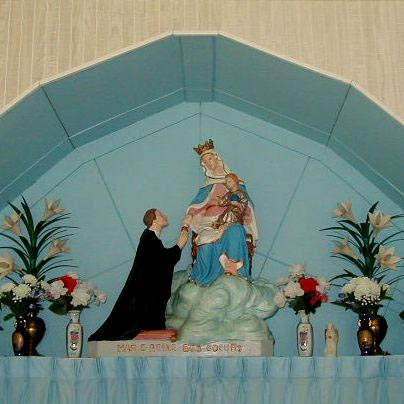 Mary, Queen of All Hearts
Mary, Queen of All HeartsThis devotion takes its origin from the book, True Devotion to Mary, by St. Louis Marie Grignon de Montfort. Therein the Saint teaches: "Mary is the Queen of Heaven and earth by grace, as Jesus is the King of them by nature and by conquest. Now, as the kingdom of Jesus Christ consists principally in the heart or the interior of man -- according to the words, 'The kingdom of God is within you' (Luke 17:21) -- in like manner the kingdom of Our Lady is principally in the interior of man; that is to say, his soul. And it is principally in souls that she is more glorified with her Son than in all visible creatures, and so we can call her, as the saints do, the Queen of All Hearts."
Devotion to Mary under this title is, therefore, an integral part of the Total Consecration to Jesus through Mary, as taught by St. Louis Marie de Montfort, just as the principal mystery honored by this Consecration is that of the Annunciation. The spiritual children of St. Louis Marie -- the members of the Religious Congregations founded by him -- have always promoted this devotion. Yet the foremost place of pilgrimage dedicated to Mary, Queen of All Hearts is relatively unknown -- the Sanctuary of Marie, Reine des Coeurs in St. Theodore de Chertsey, Quebec, Canada.
The history of this Sanctuary revolves around a pious woman, Emma Curotte. Her father, Philorum, was a Catholic from Quebec. Evidently when he moved to the United States, he strayed from the practice of his Faith and married a Protestant, Josephine Younkin. Emma was their ninth and last child. After her birth her grandfather, Antoine, convinced Philorum to return to Montreal and have the children baptized. Emma was baptized by her uncle, Fr. Arthur Curotte, on October 11, 1893.
In Montreal, although growing up in poverty, Emma was blessed with a Catholic education. At a very young age she distinguished herself by her charity for those poorer than herself. At age 14, her life took a decisive turn when she won a prize in a school drawing -- a copy of True Devotion to Mary by St. Louis Marie de Montfort. Emma zealously threw herself into this devotion, and it was not long before she made her total consecration to Jesus through Mary. She was not satisfied with merely consecrating herself; she also distributed copies of St. Louis Marie's Secret of Mary and The Little Crown of Mary. Emma's zeal soon bore fruit -- her mother Josephine was converted and baptized a Catholic in 1912.
In 1922 Philorum accepted as payment of a debt owed him a tract of land near the village of St. Theodore de Chertsey, some 40 miles northwest of Montreal. It comprised three hills, some sugar maples, a few sheds and a dilapidated farm house. Four years later Emma inherited this property. She immediately consecrated it to Jesus and Mary, in accordance with the counsel of St. Louis Marie -- to give to Jesus through Mary all our goods, both interior and exterior. She named the three hills after Mary, Queen of All Hearts, Christ the King, and the Holy Ghost.
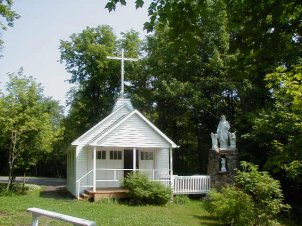 In 1931 Emma built a simple shrine for a statue of Our Lady with the Child Jesus, and attached it to a tree with two trunks. She invited a priest from Montreal, Fr. Victor Robert -- with whom she had worked feeding the poor in the Church's "soup kitchen", to pray the Rosary with her before the little shrine. He was inspired with the idea of constructing a little chapel on the spot. With permission of the local Bishop the first chapel was built out of donated scrap lumber, between the Feasts of the Assumption and the Holy Name of Mary. It measured only 13 by 16 feet. Emma had a statue of Mary, Queen of All Hearts shipped to the closest railway station. The statue had to be carted and carried the last 15 miles over difficult terrain. But all these efforts soon bore fruit -- this insignificant hillside was transformed into a place of pilgrimage.
In 1931 Emma built a simple shrine for a statue of Our Lady with the Child Jesus, and attached it to a tree with two trunks. She invited a priest from Montreal, Fr. Victor Robert -- with whom she had worked feeding the poor in the Church's "soup kitchen", to pray the Rosary with her before the little shrine. He was inspired with the idea of constructing a little chapel on the spot. With permission of the local Bishop the first chapel was built out of donated scrap lumber, between the Feasts of the Assumption and the Holy Name of Mary. It measured only 13 by 16 feet. Emma had a statue of Mary, Queen of All Hearts shipped to the closest railway station. The statue had to be carted and carried the last 15 miles over difficult terrain. But all these efforts soon bore fruit -- this insignificant hillside was transformed into a place of pilgrimage.
Emma took up permanent residence in the old farm house the very next year. Her spiritual life of union with Jesus and Mary became more intense, and she was inspired to compose this prayer:
O Mary, Queen of All Hearts, Advocate of the most hopeless cases; Mother most pure, most compassionate; Mother of divine love, full of divine light, we confide to thy care the favors which we ask of thee today. Consider our misery, our tears, our interior trials and sufferings! We know that thou canst help us through the merits of thy Divine Son, Jesus. We promise, if our prayers are heard, to spread thy glory, by making thee known under the title of Mary, Queen of All Hearts, Queen of the Universe. Grant, we beseech thee, hear our prayers at thine altar, where every day thou givest so many proofs of thy love and power to heal both body and soul. We hope against all hope. Ask Jesus to cure us, pardon us, and grant us final perseverance. O Mary, Queen of All Hearts, cure us, we have confidence thee (3 times).
Emma truly lived the words of this prayer and, after its Ecclesiastical approval, did indeed make Our Lady known under this title. She had the prayer translated and printed copies were distributed all over the world.
 The well-known Brother André, founder of the Oratory of St. Joseph of Mont Royal, visited the Sanctuary in 1936, calling it, perhaps prophetically, the Oratory of Chertsey. He prayed before the statue in the little chapel and then climbed to the top of the hill. From there he could see in the distance the Oratory of St. Joseph. And it was there that the new chapel to Mary, Queen of All Hearts was built, after the first chapel burned down in December of 1944. In 1947 the "Chapel of the Lamps" was built on the site of the original chapel. Before Emma Curotte's death in 1961, the Sanctuary of Mary, Queen of All Hearts was being visited by thousands of pilgrims every year.
The well-known Brother André, founder of the Oratory of St. Joseph of Mont Royal, visited the Sanctuary in 1936, calling it, perhaps prophetically, the Oratory of Chertsey. He prayed before the statue in the little chapel and then climbed to the top of the hill. From there he could see in the distance the Oratory of St. Joseph. And it was there that the new chapel to Mary, Queen of All Hearts was built, after the first chapel burned down in December of 1944. In 1947 the "Chapel of the Lamps" was built on the site of the original chapel. Before Emma Curotte's death in 1961, the Sanctuary of Mary, Queen of All Hearts was being visited by thousands of pilgrims every year.
Based on the writings of Mother Mary Potter
Do we understand the "love of possession"? It soon springs up in the mind of the child, and grows with its growth. It is not an evil when the possession is just, unless carried to excess. The child loves to possess its toys; the bridegroom rejoices in the possession of his bride, the mother in the possession of her child, and our Mother in the possession of her own.
Her little earthly flock is a great delight to the heavenly Shepherdess, a great joy. Are we, who rejoice in the name of Mary's own, striving to increase our Mother's joy, by giving her more children, by adding to her flock? We ourselves feel the beauty of the True Devotion. We feel how secure are those who embrace it and perseveringly practice it. We know how well armed they are for the conflict of this life. We feel sure that they will most certainly reach Heaven, if they do not stray from the path of Mary. We know all this. We picture our Mother in Heaven, speaking to her children on earth, as she sends them forth to work for her: "Fear not, little flock, for it has pleased your Heavenly Father to give you a kingdom."
We believe that Our Lady blesses with a special blessing those who are her own. And yet, are we striving to extend her kingdom? Are we adding to Mary's flock one little lamb after another? Are we striving with might and main to hasten the coming of that time which many Saints tell us is surely to come? "The Reign of Mary" is that time when Jesus will reign in all hearts, because Mary will have established her reign in all hearts. Are we letting our light shine before men, or are we hiding it under a bushel? Are we calling our friends and neighbors to rejoice with us in the treasure we have found, or are we standing idle when there is so much work to be done? "The harvest indeed is great, but the laborers are few." Mary's harvest, Mary's children must band together. They must ever have one thought, how best they may help to establish the kingdom of God upon earth -- the reign of Mary, Queen of All Hearts, by planting the good seed of True Devotion to Mary. The work can be done in so many ways: by lending a book, by a few words spoken along with a silent prayer, by persevering efforts where, strange to say, there exists a prejudice against the devotion. Love will teach us, if we are truly her loving, devoted children, how to bring others around to the sweet empire of Mary.
We need special help at special times. We need to throw ourselves upon Mary's maternal care if we would escape shipwreck in these stormy times. Holy Angels, whisper to your clients to trust themselves to Mary, to consecrate themselves entirely to her, to hope in her, to love her as their very own most precious Mother. "Powerful as an army set in battle array," she will defend us from our enemies. She will intercede, she will protect, she will guard as most precious treasures all who are devotedly given to her. Mothers, bring your children, and give them to Mary. Teach them while young the sweet way of Mary. So will you bring them to their home in Heaven. Pray for those you love, that they may learn this most sweet, safe, secure way to God. Thus will families, united together on earth, be united together in Heaven. Thus, too, will pastor and people stand before the judgment seat of God in exceeding joy. Happy are those pastors who have confided their flocks to the maternal care of Mary and consecrated them to her. Happy those who have taught them how to ratify this consecration.
Most of us enter this sweet way of Mary not fully understanding what it implies, trusting to those who have gone before us. But if we persevere, soon, like the dawning of the morning, will appear the wondrous rays of light, leading our souls into a new life, opening things hidden to view, revealing to us our God as we never knew Him before. Truly Mary makes us know Him in some degree, though it be but little, as she knew Him on earth.
Well will it be for us if we enter on this way, well for us if we lead all we can therein. Well, indeed, will it be if we persevere, and do not stray therefrom when once we have entered it. For we may stray through carelessness, through want of watchfulness, through negligence. We can, if we choose, advance, and then retrace our steps, for it is with this devotion, as with all else in this world: it depends entirely on our own correspondence with grace whether we reap its advantages or not. We may be drawn into close union with Jesus by faithfully keeping in Mary's company, and then we may gradually relax, grow cold, and lose our hold of the hand of Jesus, which was leading and supporting us. With tears we may try in vain to recover again its warm clasp, that is, the almost sensible perception of His merciful guidance and support. Our Mother in pity comes to help us. She shows us how we have strayed from our path, and leads us on our road again to Jesus' feet.
Look well, then, and examine, you who belong to Mary. Are you doing your best for your Mother? Are you doing your best in your own soul, your best in the souls of others, or are you lagging on the way? Stir yourself up if it be so, rouse yourself to greater vigilance, to more earnestness. Commence again your practices of devotion with renewed vigor. Remember the constant little acts by which you repeat again and again to Our Lady during the day that you renounce your own spirit, your own will, that you may live by her spirit, by her will. Tell her that you do whatever you do because you believe that she would wish you to do it, not because you yourself wish it. This devotion, I repeat, will lead all to perfection. This is living a life most pleasing to our God. This is, indeed, being cast in the mold of Mary, to be formed anew, to live no longer by your own spirit, but by the sweet spirit of Jesus and Mary. All Mary lived for was to fulfill the will of Jesus. She had none of her own apart from Him. So it should be with us, a total subduing and renunciation of self, that "God alone" may be our motto, His Holy Mother's honor our password, the love of one another our daily practice. As the angels and saints, God's heavenly children, love one another, so let us, looking upon ourselves and others as God's earthly children, as in truth we are, act as God's children should, and love one another.
Bless thy children, Mother Mary, that they may live as thou didst, a life of love, such as may show them to be true children of the God of love. Amen.
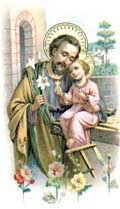 The Power of Saint Joseph
The Power of Saint JosephOne cannot wonder that this great Patriarch should be so powerful, seeing that he commands the two authorities of Heaven and earth, Jesus and Mary. The learned Gerson speaks of him as a protector; influential, powerful, almost all-powerful, since he is the reputed father, the foster-father and guardian of Jesus, and the spouse, protector and guardian of Mary. What can be refused to the man who produces titles so valid and authentic as these? Besides, whatever Jesus asks from His Heavenly Father, the Father wills; whatever Our Lady asks from her beloved Son, the Son wills; and whatever Joseph asks from his holy Spouse, she wills. Does it not follow that as Mary is all-powerful through Jesus, Joseph is all-powerful through Mary? Oh, how good it is to have St. Joseph for an advocate, since nothing in the world is impossible to him!
The other Saints supplicate Jesus and Mary. Saint Joseph commands Them; this bold idea of Origen has been adopted by several Doctors of the Church. Saint Joseph supplicates as one commanding, or rather, the humility of this holy man is too great to permit him to command the Lord Jesus; but the goodness of Our Lord is so condescending, that He accepts the prayers of Joseph as paternal commands, and grants all he requests. Happy Patriarch! who alone of all men has relations so special, union so intimate with the Savior of the world, and His most holy Mother! The Son of Mary owes thee obedience; thy spouse owes thee honor, thou hast the right to command them both; canst thou then fear to pray to them for thy clients?
When two just men consent upon earth concerning anything whatever that they request in the name of Jesus Christ, it shall be granted to them by His Father in Heaven (Matt. 18: 19). Here, indeed, is this promise of the Savior verified. When Mary and Joseph plead together before the throne of their Divine Son, in favor of one of their servants, is there any grace which they cannot obtain?
Gerson recounts that those who, having lost any object, recommend themselves to Saint Joseph, are sure to find it again. Alas! we have lost God by sin, and losing God we have lost Paradise, we have lost all! Let us often say to our holy Protector those words of the Gospel: "Sir, we would see Jesus" (John 12: 21). Sweet Joseph, we have lost Jesus; will thou not show Him to us, and give Him back to our souls? Mary and Joseph, we have lost Him Who is all our joy, have not you found Him? O Joseph, lead us back to Jesus and Mary! Let us again find all Three, to praise and bless and love all Three, throughout all eternity.
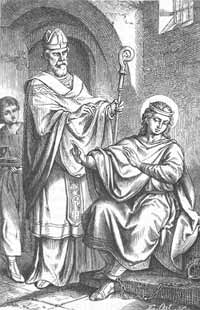 Champions of Catholic Orthodoxy
Champions of Catholic OrthodoxyLiuvigild, King of the Arian Visigoths of Spain, had two sons -- Hermenegild and Recared -- with whom he divided his kingdom, in order to ensure that the crown would remain in his family. Although he educated his sons in the Arian heresy, which he himself professed, Liuvigild arranged for Hermenegild to marry a Catholic princess -- Ingondes, daughter of Sigebert, King of Austrasia. Ingondes had much to suffer from Liuvigild's second wife; nonetheless she remained steadfast in her faith. Such was the force of her example, and of the instructions of St. Leander, Bishop of Seville, that the prince was converted. Taking advantage of his father's absence, Hermenegild abjured his heresy and was received into the true Church.
When Liuvigild was informed of his son's open profession of the Catholic Faith, in a transport of rage he divested him of the title of King, and resolved to deprive him of his possessions, his princess, and even his life, unless he returned to his former heresy. Hermenegild resolved to stand upon his defense, and was supported by all the Catholics in Spain; but they were too weak to defend him against the Arians. He sent St. Leander to Constantinople to appeal to the Emperor, but the Imperial forces were needed to defend against the Persians. He next sought assistance from the Roman forces still stationed in Spain. They promised by oath to protect him and gave safe passage to Ingondes and her infant son; but later they accepted bribes to betray Hermenegild. Being informed of their treachery, Hermenegild fled to Osseto, a well-fortified city, in which there was a church held in particular veneration all over Spain. He shut himself up in this fortress with three hundred choice men; but the place was taken and burned by Liuvigild. The prince sought refuge in the church at the foot of the altar. Not willing to violate the holy place, Liuvigild sent Recared into the church with a false offer of reconciliation. Hermenegild believed his father to be sincere, and came out of the church. His father embraced him and renewed his fair promises, till he got him into his own camp. He then ordered him to be stripped of his royal robes, loaded with chains, and conducted as a prisoner to the tower of Seville.
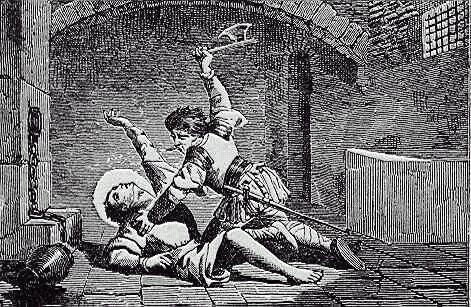
Holy Saturday being come, the perfidious father sent to him an Arian bishop in the night, offering to take him into favor if he received communion from the hand of that heretic; but Hermenegild rejected the proposal with indignation, reproaching the messenger with the impiety of his sect. When the bishop returned with this account, the furious father, seeing the faith of his son stronger than all his endeavors to pervert him, sent soldiers to execute him. They entered the prison and found the saint fearless and ready to receive the stroke of death, which they instantly inflicted upon him, cleaving his head with an axe.
St. Gregory the Great attributes to the merits of this martyr the conversion of his brother, King Recared, and of the whole kingdom of the Visigoths in Spain. Liuvigild was stung with remorse for his crime, and although lacking the courage to abjure his own errors, yet on his death-bed he encouraged Recared to receive instruction in the true Faith from St. Leander. Recared thus became the first Catholic King of Spain. St. Gregory the Great sent him a precious relic of the True Cross after his conversion.
St. Hermenegild began to be truly a king, says St. Gregory the Great, when he became a martyr. His refusal to compromise his Faith remains an inspiration to all true Catholics who reject the heretical liturgy of Vatican II.
Visit also: www.marienfried.com